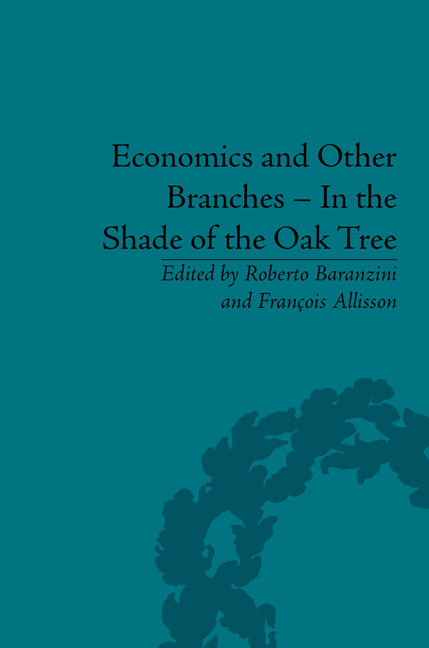Book contents
- Frontmatter
- CONTENTS
- List of Contributors
- List of Figures and Tables
- Introduction
- Pascal Bridel's Bibliography (up to 2013)
- Part I Léon Walras's Economic Thought
- Part II The Spreading of Thought
- Léon Walras's Reception
- The Lausanne School
- French Matters
- Cambridge UK
- Part III Monetary Theory
- Part IV Methodology
- 18 The Economics of Ethics and the Ethics of Economics in Adam Smith
- 19 Why do Economists and Philosophers Resort to the History of their Discipline?
- 20 Interest-Based Prediction and Mutual Expectations: Reflections on the Normative Value of Hobbesian Methodology
- 21 Tempests of the Business World: Weather Metaphors for Crises in the Nineteenth Century
- 22 Samuelson and the Non-Substitution Theorem: Some Methodological Remarks
- Part V Economics and Humanities
- Economics and Social Sciences
- Some Insights from Visual Arts
- Part VI Economics and Civil Society
- Notes
- Index
20 - Interest-Based Prediction and Mutual Expectations: Reflections on the Normative Value of Hobbesian Methodology
from Part IV - Methodology
- Frontmatter
- CONTENTS
- List of Contributors
- List of Figures and Tables
- Introduction
- Pascal Bridel's Bibliography (up to 2013)
- Part I Léon Walras's Economic Thought
- Part II The Spreading of Thought
- Léon Walras's Reception
- The Lausanne School
- French Matters
- Cambridge UK
- Part III Monetary Theory
- Part IV Methodology
- 18 The Economics of Ethics and the Ethics of Economics in Adam Smith
- 19 Why do Economists and Philosophers Resort to the History of their Discipline?
- 20 Interest-Based Prediction and Mutual Expectations: Reflections on the Normative Value of Hobbesian Methodology
- 21 Tempests of the Business World: Weather Metaphors for Crises in the Nineteenth Century
- 22 Samuelson and the Non-Substitution Theorem: Some Methodological Remarks
- Part V Economics and Humanities
- Economics and Social Sciences
- Some Insights from Visual Arts
- Part VI Economics and Civil Society
- Notes
- Index
Summary
Introduction
Interest-based individual action is both a predictive resource in social science and a tool for the normative assessment of social life and collective institutions. This association, I will argue, helps to clarify why the liberal and non-liberal doctrines about politics and economics can find a common ground in the kind of political methodology Hobbes promoted. Liberalism old and new is obviously not a theory of freedom alone: it is also a theory of coercion. Among the classical thinkers of man-made legitimate coercion, Hobbes stands out as an all-time intellectual model. Taking a look at some aspects of his intellectual legacy may help us understand the complex association of freedom and coercion we find at the heart of liberalism.
The fact that Hobbes's political theory remains an important reference point for present-day liberalism and economic conceptions of liberalism is understandable because this theory endeavoured to justify exactly what stands to be monitored from a present-day neoliberal standpoint, namely, the Sovereign's power, as historically embodied in national-State power (by now the object of consistent attacks which come from the neoliberal fringe of conservative thinking and also from anti-capitalist circles). But there are other, slightly less obvious reasons to believe in the importance of this connection. In particular, I would like to draw attention to the common problems which lie in the analysis of social interaction, when it is structured, as well as threatened, by the individual pursuit of self-interest.
- Type
- Chapter
- Information
- Economics and Other Branches – In the Shade of the Oak TreeEssays in Honour of Pascal Bridel, pp. 277 - 290Publisher: Pickering & ChattoFirst published in: 2014



